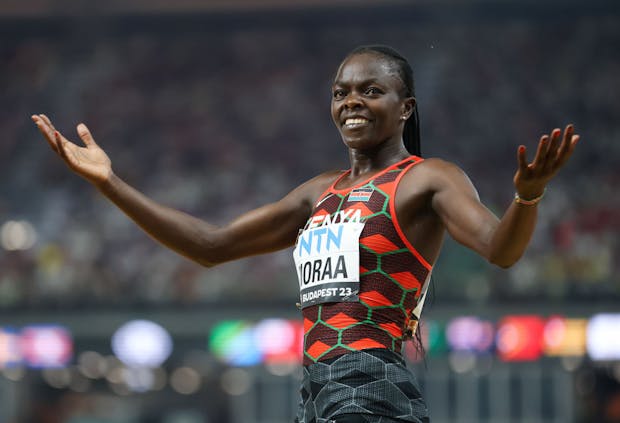
The new World Athletics Ultimate Championship, a biennial event that currently sits outside the federation’s existing rights agreements, will give organisers “more skin in the game” in terms of inventory, according to the body’s president Sebastian Coe.
Having worked on the plans for the new “best of the best” event during the last two years, World Athletics has unveiled Budapest as the host of an inaugural event in 2026. The three-day event will be held biennially, including in summer Olympic years.
As new inventory, the event is not bound by the terms of World Athletics’ long-running deals with Dentsu and the European Broadcasting Union. As such, host venues will be able to directly generate revenues from domestic broadcast and sponsorship rights sales.
World Athletics Championships organisers typically generate revenues from ticketing sales and have also tended to reach ‘Category Release Agreements’ with Dentsu in order to be able to sell selected domestic sponsorship, hospitality and merchandising rights.
Fielding a question from SportBusiness during a press conference today (Monday), Coe said: “One of the inhibitors that we have found – and these are arrangements settled upon before my tenure – has often been that host cities haven’t really felt that they’ve had as much skin in the game as they should have done.
“This was a concerted effort to make this a very different model [for the host cities and the athletes].
“It allows us certain flexibilities that we don’t have under some of those other formalised [commercial] relationships. It gives us a better control over broadcast, what the images look like and better control over the product.”
The new event will boast a record prize pot of $10m (€9.2m) with gold medal winners receiving $150,000, three times the sum to be offered to Paris 2024 gold medal winning athletes under World Athletics’ controversial initiative announced in April.
The event will return to the scene of last year’s World Athletics Championships but the federation cited interest from “a number of major global cities” in its announcement.
In Budapest, athletes will be afforded greater promotional rights, including the carving out of rights from contracts to allow them to post content on social media. An athlete’s digital team will also be able to create content in competition venues.
In its latest bid to secure a slice of sport’s fragmented audience, World Athletics has promised a “thrilling and fast-moving” compact new format. The three sessions will take place on the evenings from September 11 to 13, 2026 and will each be under three hours in length.
The event, which will feature close to 400 athletes during its inaugural edition, is designed to be the climax of athletics’ global calendar.
Coe stressed that World Athletics is working from a “clean sheet of paper” for the new event and “hasn’t had to offer” the rights to existing commercial partners. However, given his renewed call today for increased free-to-air exposure, negotiations with the EBU seem a highly likely first port of call if not undertaken already.
He said: “We are not just going to chase the greatest revenue stream we can from broadcasters who may not be able to show it in the numbers that we want.”
Coe continued: “This is where I ultimately believe we should be. This gives us the opportunity in a really polished format in 2026 to develop this. It’s a bit of an incubator.”
The EBU’s current contract runs from 2024 to 2029 and covers broadcast rights in Europe and sub-Saharan Africa across all platforms. Broadcast rights outside of those territories to World Athletics Series events are held by Dentsu until 2029. International rights to the Diamond League are sold by the IMG agency but rival Infront will assume the contract from 2025 onwards.
Dentsu also acquired worldwide sponsorship and licensing sales rights in a deal struck a decade ago under the tenure of Coe’s predecessor, Lamine Diack. In 2021, World Athletics renegotiated the contract over realising profit share revenues more frequently.
In a shift in sponsorship strategy, Asics, one of World Athletics’ five top-tier sponsors, will not be able to claim exclusivity at the new event. It currently kits out officials and volunteers at World Athletics Series events with footwear and apparel.
Jon Ridgeon, World Athletics’ chief executive, remarked: “We will not have a major shoe company sponsoring this event. It will be shoe agnostic. That’s so important because in our conversations with major shoe companies it will allow all of them to get behind this event and their athletes and use their promotional platform for the sport.
“We’re trying to make it a new generation of Championships which we believe, in time, will ultimately influence how all of athletics is delivered.”
He added: “There will be a strong focus on television audiences, with an aim to reach the biggest global audience possible. We also want to enhance the viewing experience, both at home and in the stadium, so we are looking at what new competition innovations can be introduced, all of which will be thoroughly tested in advance.”
‘Appetite way beyond Olympics’
The second iteration would likely take place on the back of the 2028 Los Angeles Olympics.
Coe, fresh from attracting a string of criticism in federation circles for the nature of the Olympic prize money announcement, today sought to downplay any impact the new event could have on the Games themselves.
“It’s not about trying to sandwich something in”, he stressed. “That’s not the concept. It would have been complicated to have a World Championships in an Olympic year. We’ve always avoided that.
“There is an appetite for athletics way beyond the Olympic Games. That’s not something that every sport enjoys.
“The Olympic Games will be an extraordinary platform in 2028 but I don’t think that stops us creating another platform for them [the athletes] and that’s what I’m elected to do. Another platform weeks after is not competitive – it’s collaborative to more people watching Olympic sport.”